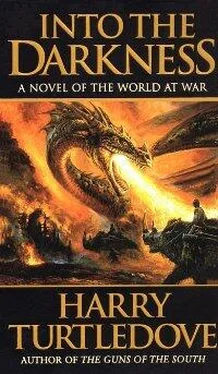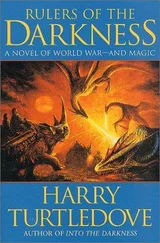They were hungry opportunists, too, converging like locusts on the buffet Valnu’s servants had set out. Some of the dishes there were hearty Valmieran sausages and breaded chops and the like, others more delicate, more elaborate Algarvian-style creations. The Algarvian soldiers and civilians ate in moderation. Many of the Valmierans gorged. Food, especially fine food like this, wasn’t easy to come by in Priekule these days.
Krasta had no great interest in what the Algarvians ate, or in anything else new. Sausage and red cabbage suited her fine. After a couple of shots of sweet cherry brandy, everything Lurcanio said got wittier and funnier.
When he slipped an arm around her waist in a proprietary way, she snuggled against him instead of flinging brandy in his face.
She was, by then, rather glad of that arm. It kept most of the Algarvians in the milling crowd from pinching her, patting her, and feeling her up. Not all of them, though: that she was a colonel’s companion did nothing to intimidate a couple of brigadiers and more than a couple of the civilian dignitaries who ruled occupied Valmiera.
“Do your men always act this way?” she asked Lurcanio after snarling at a functionary who’d made too free with his hands and also contriving to step on his foot.
“Very often,” he answered calmly. “But then, our women act much the same way. It is the custom in our kingdom—not better or worse than the customs here, simply different.”
What Krasta had heard was that all Algarvian women were sluts. She started to say as much, but checked herself. She’d already seen that insulting the conquerors was not a good idea. And she’d also noted that Valnu’s salon, at the moment, held a good many Valmieran sluts.
She kept looking around, spotting people she knew and seeing who among her set might have been there but was not. A lot of people, both Valmierans and Algarvians, kept looking around. Had people who weren’t there simply not been invited—because they were dull, say? Or had they declined to come because they didn’t care to be seen with the Algarvians? Much of the chatter was hard and brittle, a sort of crust over things better left unsaid.
A Valmieran band—thundering horns and thumping drums—replaced the musicians playing Algarvian songs. A little space cleared in the center of the large chamber. Couples began to dance. “Shall we?” Krasta asked, saucily glancing up at Lurcanio.
“And why not?” he said. He proved to dance very well, and knew the steps that went with the Valmieran music. When the time came to hold her close, he didn’t try to consummate things out on the dance floor, as Valnu had in the cellar before the Algarvian invasion. Then again, Krasta wasn’t egging him on, as she had with Valnu. Lurcanio acted as if he had nothing he needed to prove along those lines because everything was already decided. Krasta couldn’t decide whether that miffed or excited her. Between dances, she drank more brandy. That helped make up her mind. A lot of the Algarvians were with women who had already made up their minds. Krasta didn’t see anything she hadn’t seen before, but she’d seen a good deal. They’ve decided who’s won the war, she thought. And if she had not, would she have been here on the arm of and in the arms of an Algarvian nobleman?
Presently, Lurcanio leaned forward and murmured in her ear: “Shall we return to your mansion? I fear I have a few too many years and a bit too much dignity to care to make a public exhibition of myself.”
Krasta had drunk enough brandy to need a few seconds to realize what that meant. When she did, she hesitated, but not for long. Having gone this far, how could she stop? And she didn’t want to stop, not now. She took Lurcanio’s arm, reclaimed her cape, and made for the door.
Valnu stood just outside the doorway, arm in arm with a handsome young Algarvian officer. He smiled dazzlingly at Krasta and Lurcanio, then called after them: “Don’t do anything I wouldn’t enjoy!” As far as Krasta knew, that gave them free rein.
Lurcanio’s driver smelled of brandy. He said something in Algarvian. He and Lurcanio both laughed. “He is jealous of me,” Lurcanio said as he helped Krasta into the carriage. He laughed again. “He has reason to be jealous of me, I expect.”
When they got back to the mansion, none of Krasta’s servants was in sight. No one watched her and Lurcanio go up the stairs to her bedchamber together—or she saw no one watching, which in her mind amounted to the same thing.
In the bedchamber, Lurcanio took charge, as he had throughout the evening. He decided a lamp would remain burning. He undressed Krasta, kissing and caressing her breasts after he pulled her tunic off over her head, then unlacing her trousers and sliding them down her legs. She sighed, at least as much from relief as from desire.
But desire was there, too, and the Algarvian knew just how to fan it. Before long, Krasta was doing everything she could to inflame him, too. He was, she discovered, circumcised, which Valmieran men were not. “Rite of manhood,” he said. “I was fourteen.” He poised himself between her legs. “And now for another rite of manhood.”
After the rite was accomplished—most enjoyably accomplished—they lay side by side. Even then, Lurcanio’s hands roamed over her body. “You are generous to a soldier in a kingdom not his own,” he said. “You will not be sorry.”
Krasta rarely thought about being sorry. She’d never thought about it in the afterglow of lovemaking. She’d sometimes been angry then, which spoiled things, but never sorry. “Soon you Algarvians will rule the world, I think,” she said, which was and was not an answer.
“And you have chosen the winning side?” Lurcanio ran his fingers through her bush. “You see? You are a practical woman after all. Good.”
Even though Talsu sometimes wore his Jelgavan army uniform tunic and trousers on the streets of Skrunda, his home town, no Algarvian soldier who saw him had ever given him a rough time about it. He was glad. He did not have so many clothes as to make it easy for him to set any of them aside. Nor was he the only young man in Skrunda in pieces of uniform. That was true of most of the former soldiers the Algarvians hadn’t scooped into their captives’ camps.
Like his former comrades, he made money where he could, pushing a broom or carrying sacks of lentils or digging a foundation. One day, after lugging endless sacks of beans and clay jars of olive oil and sesame oil from wagons into a warehouse the Algarvians were using, he came home with half a dozen small silver coins stamped with the image of King Mezentio. They rang sweetly when he set them on the table at which his family ate.
“What have you got there?” his father demanded. Traku was a wide-shouldered man who looked as if he ought to be a tough but was in fact a tailor. His trade having left him shortsighted, he bent close to the coins to see what they were. Once he did, he growled a curse and swept them off the table and on to the floor. The cat chased one as it rolled.
“What did you go and do that for, Father?” Talsu crawled around on hands and knees till he’d found all the money. “Powers above, it’s not like we’re rich.”
“I don’t want that ugly whoreson’s face in my house,” his father said. “I don’t want the fundament of that ugly whoreson’s brother stinking up our throne, either. No redhead’s got any business sitting on it. It’s not their kingdom. It’s ours, and they can’t take it away from us.”
“Silver is silver,” Talsu said wearily. “Theirs spends as good as ours. Theirs spends better than ours, because they’ve buggered up the exchange rate so the redheaded soldiers can buy pretties for their mistresses on the cheap.”
Читать дальше












